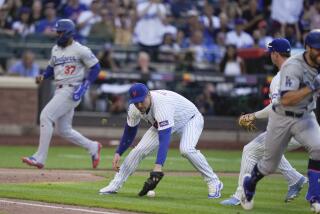Youthful Met GM Phillips Is Dialed In
- Share via
He doesn’t look a day over 30, the blond man standing behind the Dodger Stadium batting cage, wearing the starched white shirt and the black loafers with the tassels. He is general manager of the New York Mets, not a bad job to have. The job has been his for eight days.
“Are you the youngest GM in baseball?” Steve Phillips is asked.
“Not quite,” he says. “Randy Smith’s got me, in Detroit. But not by much.”
At 34, the Mets’ new boss is younger than his team’s relief pitcher, John Franco, by a couple of years. He hardly expected to be standing here in July, in charge of a contending National League team, but that’s the job the Mets handed Phillips on July 16, when they fired the man who hired him.
Phillips is making this trip with the Mets because the trading deadline is approaching. He says he wants to stick close to the action.
After the Mets took the job’s authority away from Joe McIlvaine, much was made of the GM’s reluctance to carry a cellular telephone, to remain accessible at all times. If that’s true, Joe could be the first man in baseball history to have his phone number retired.
Phillips was as surprised as anybody that his superior was let go.
“All I know is, it’s been a pretty busy week,” he says.
For one thing, the Mets went out and won seven of their next eight games, including Thursday night’s 3-1 success against the Dodgers.
For another, activity always swirls around a team with a shot at the playoffs, which puts Phillips smack in the middle of New York’s rumor whirl. After all, the next trade he makes will be his first.
One story has the new GM on his phone, seeking bullpen help for Franco. Another has him summoning the Mets’ scouting director, a man described as “embattled,” to a meeting with Phillips to decide the guy’s future with the organization.
Whatever he does, Phillips hopes it will motivate the Mets.
In the winter of 1990, he was working for a motivational firm in Port St. Lucie, Fla., the town where the Mets train. Phillips had retired from baseball in the spring of 1988, when his hometown Detroit Tigers released him from camp.
“I decided to get out,” Phillips remembers. “I’d been in the game for so many years, I figured it was time to try something else.”
He had spent 6 1/2 years bouncing around the Mets’ farm system--Kingsport, Little Falls, Columbia, Lynchburg, Jackson--after they drafted him in 1981 as an infielder. New York eventually traded him to Detroit in 1987, and soon thereafter, Phillips hung up his cleats.
That was enough baseball. Phillips enrolled at the University of Michigan and received a degree, in psychology.
It came in handy. Employed but a little bored, Phillips says, “I was sitting in my office, speaking to my mother on the telephone, telling her that I was missing baseball more than I thought I would.
“The phone rang again, and it was Joe McIlvaine, offering me a job with the Mets.”
He took it, becoming the team’s administrative assistant of scouting. Then, after the 1991 season, the Mets made him their director of minor leagues.
In the meantime, McIlvaine himself left the club. San Diego hired him in October 1990 to be general manager of the Padres.
Their paths kept crossing. McIlvaine returned in 1993, in midseason, to take charge of the Mets’ baseball operations, and he appointed Phillips assistant general manager before the 1996 season.
It wasn’t much of a year. The Mets went 71-91.
And for a while this season the bad luck continued.
“We lose Pete Harnisch with acute depression. Then we lose Jason Isringhausen with what appears to be tuberculosis. Lance Johnson gets hurt. Rey Ordonez gets hurt. Manny Alexander gets hurt. Something seemed to happen to one of our players every day,” Phillips says.
Somehow, the team held together.
How?
“Defense,” Phillips replies. “That’s my opinion, anyway. The left side of our infield, Edgardo Alfonzo and Manny Alexander? Four errors apiece.”
For comparison’s sake, Dodger third baseman Todd Zeile and shortstop Greg Gagne have combined for 29 errors.
“I don’t know exactly how we’re doing it, but we’re doing it,” Phillips says. “This has definitely been an unusual year.”
More to Read
Go beyond the scoreboard
Get the latest on L.A.'s teams in the daily Sports Report newsletter.
You may occasionally receive promotional content from the Los Angeles Times.










